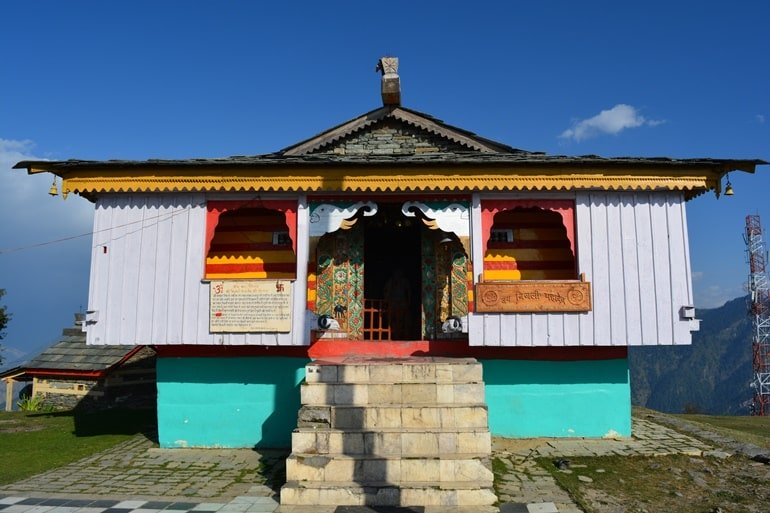The BIJLI MAHADEV TEMPLE, which literally translates to ‘Electric Mahadev’ is no less electrifying than
its name. This legendary temple is at an altitude of 2,460 m on top of Mathan hill in the
Kullu valley which is referred to as ‘The valley of God’. Surrounded by Pir Panjal range on one side
and Parvati on the other, the Kullu valley welcomes its visitors with majestic and breathtaking
landscapes, rich culture, and heritage.
This Lord Shiva temple is quite unique and is named after a supernatural phenomenon. It is said that
the ‘Shiva Linga’ in the temple is occasionally struck by lightning and it shatters into pieces. The
priest then uses butter as an adhesive to put the statue together. Thrilling, right? This place is full of
mysteries and miracles that will blow your mind.
The temple depicts typical hill architecture and is made of wood and stone with a sloping wooden
roof. The tranquility of the place will surely lure you when you explore the temple’s heritage,
especially the carving on wood and vibrant paintings on the temple doors. The 60 feet high staff of
Bijli Mahadev temple glistens like a silver needle in the sun. it is said that the tall staff attracts the
divine blessings in the form of lightning. One can witness the charred part (especially on the walls)
inside the temple which is due to the flames resulted during lightning.
THE TREK:
DAY 1: JANA VILLAGE TO MATIKOCHAR (5 hours)
The trek starts from Jana village passing the ancient village of Naggar which was once the capital of
the Kullu Kingdom. Climb the stairs which cross verdant forests, paddy fields and terraced orchards
of apples, pears and pomegranate, and a small Himalayan Village called Jana. Enjoy the spectacular
panoramic views from the temple overlooking the Parvati and Kullu Valley. The steep forest trail will
take you to typical Kullu villages, giving you ample chances to explore the before reaching the
Matikochar Ridge in the Kais Wildlife Sanctuary amidst forests of Pine and Deodar. You can chose to
stay here for the night and take rest at the camps in Matikochar.
DAY 2: MATIKOCHAR TO BIJLI MAHADEV (4 hours)
The next day you can start early and walk through the Kais Wildlife Sanctuary. Walk through the
woodland and then enter the wide grass field which leads to Bijli Mahadev temple. The enthralling
views throughout the trek will leave you spellbound and you will be amazed to see the confluence of
Parvati and Beas River from the top, don’t forget to capture it through your lens to keep it as a
memoir forever. Offer your prayers at the Bijli Mahadev temple. Some puja articles are available
inside the temple without any additional cost. Photography is not restricted anywhere in the place.
Camp at Bijli Mahadev for a night and enjoy nature to the fullest.
DAY 3: Trek to your base or you can also take a taxi from Bijli Mahadev for Manali or Kullu
IMPORTANT NOTE
Carry your camping equipments if you want to stay in Bijli Mahadev for more than a day. Small local
shops can provide you with refreshments during the trek . Make sure to trek during the day time as
it can be a bit dangerous during night. There can be minor injuries while trekking like bruises, knee
or arm sprain, etc, so keep first aid handy. The ridge along the temple is prone to lightning. Hence
during thunderstorms, stay below tree-line, keep away from tall trees and avoid height ground.
There are few restaurants here that can provide good Chinese food like Momos etc. As the trek is
not very easy and involves climbing etc, it is advisable for people who can’t trek to take another
route from Naggar to Bijli Mahadev, which is motorable. From this route you can reach the temple
directly.
SEASON: April – November end
MAX. ALTITUDE: 3600m
HIGH PASSES: Chanderkhani Pass (3600m)
TREK GRADIENT: Easy to moderate.
WEATHER: because of its altitude, the weather is unpredictable. The best time to visit Bijli Mahadev is
during summer as it is pleasant and not very cold. During winters and rainy seasons, the weather is
cold and the road becomes slippery, which makes trekking difficult.


Comment (0)